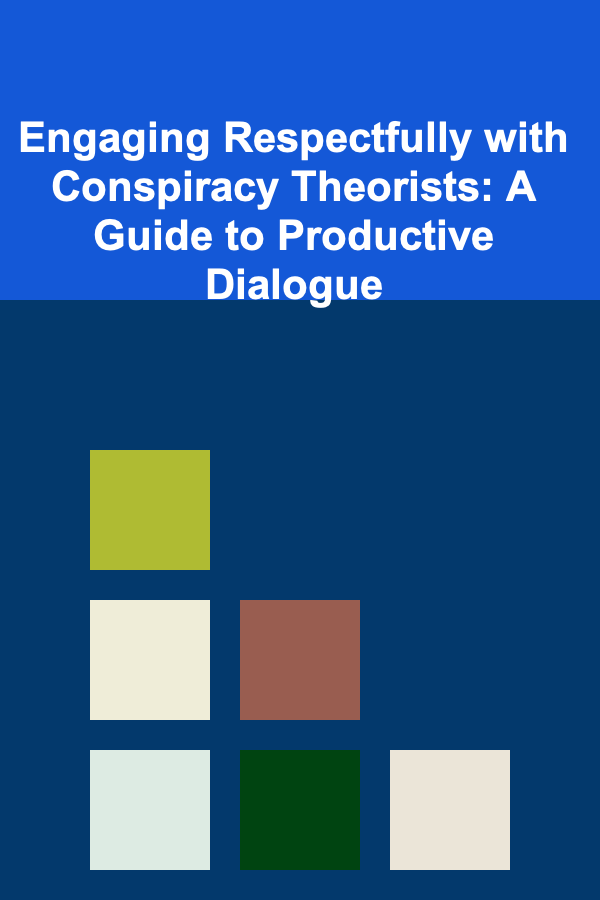
Engaging Respectfully with Conspiracy Theorists: A Guide to Productive Dialogue
ebook include PDF & Audio bundle (Micro Guide)
$12.99$9.99
Limited Time Offer! Order within the next:

In an era defined by information overload and deep-seated distrust, conspiracy theories have become increasingly prevalent. They permeate social media, seep into political discourse, and even strain personal relationships. Dismissing those who subscribe to these theories as simply "crazy" or "ignorant" is not only unproductive but also potentially harmful. It reinforces their sense of alienation and pushes them further into echo chambers where their beliefs are constantly validated. Instead, understanding the underlying motivations behind these beliefs and learning how to engage with conspiracy theorists respectfully is crucial for fostering constructive dialogue and potentially influencing their perspective.
Understanding the Appeal of Conspiracy Theories
Before attempting to engage with someone who believes in a conspiracy theory, it's essential to understand why these theories are so appealing. They often provide a sense of control, certainty, and belonging in a world that feels increasingly chaotic and unpredictable. Here are some key psychological and social factors that contribute to their allure:
1. Need for Control and Understanding
Humans have a fundamental need to understand the world around them and to feel a sense of control over their lives. When faced with complex or traumatic events, conspiracy theories can offer a seemingly simple explanation, attributing blame to a specific group or entity. This provides a sense of closure and reduces the anxiety associated with uncertainty. For example, after a major disaster like a plane crash or a terrorist attack, conspiracy theories often emerge to explain the events, suggesting a hidden motive or a deliberate act of sabotage. This is because accepting random chance or incompetence as the cause can be deeply unsettling.
2. Epistemic Motivations: Searching for Knowledge and Certainty
Conspiracy theories often appeal to individuals who feel that mainstream sources of information are unreliable or biased. They see themselves as "truth seekers" who are uncovering hidden knowledge and exposing the "real" story behind events. This quest for alternative knowledge can be a powerful motivator, especially for those who feel disenfranchised or marginalized by traditional institutions. The feeling of being "in the know" and possessing secret information can be highly rewarding and can contribute to a sense of intellectual superiority. This also taps into the Dunning-Kruger effect; where people with low competence overestimate their abilities, in this case, their ability to discern "truth."
3. Social Motivations: Belonging and Identity
Belief in a conspiracy theory can provide a sense of belonging to a community of like-minded individuals. Online forums and social media groups dedicated to specific conspiracy theories offer a space for people to share their beliefs, support each other, and reinforce their shared identity. This sense of community can be particularly appealing to individuals who feel isolated or disconnected from mainstream society. Sharing a belief system, even one that is considered unconventional, can create strong bonds and provide a sense of purpose.
4. Existential Motivations: Managing Anxiety and Threat
Conspiracy theories can also serve as a coping mechanism for dealing with anxiety and fear. By attributing negative events to the actions of a powerful and malevolent force, individuals can feel like they are better equipped to protect themselves and their loved ones. This is particularly true during times of crisis or uncertainty, such as a pandemic or a political upheaval. The narrative of a hidden enemy provides a clear target for blame and can reduce the feelings of helplessness associated with complex problems.
5. Distrust in Authority and Institutions
A growing distrust in governments, media outlets, and scientific institutions has fueled the rise of conspiracy theories. When people feel that they are being lied to or manipulated by those in power, they are more likely to seek out alternative explanations for events. This distrust can stem from various factors, including past experiences of deception, perceived biases in media coverage, and a general sense of alienation from the political process. Conspiracy theories often exploit this distrust by portraying themselves as the only sources of honest and reliable information.
Principles for Respectful Engagement
Engaging with someone who believes in a conspiracy theory can be challenging, but it is essential to approach the conversation with respect and empathy. Here are some key principles to keep in mind:
1. Listen Empathetically and Avoid Judgment
The most crucial step in engaging with a conspiracy theorist is to listen attentively and try to understand their perspective. Avoid interrupting or dismissing their beliefs outright. Instead, ask open-ended questions to encourage them to elaborate on their reasoning and the evidence they rely on. Show genuine interest in their viewpoint, even if you disagree with it. For example, you could say, "I'm interested in understanding why you believe that. Can you tell me more about what led you to that conclusion?"
Avoid judgmental language or condescending tones. Statements like "That's ridiculous" or "You're being naive" will only shut down the conversation and reinforce their defensiveness. Instead, use neutral language and focus on understanding their reasoning. Remember, the goal is to build a connection and foster a dialogue, not to win an argument.
2. Find Common Ground and Shared Values
Identifying common ground can help build rapport and create a more conducive environment for discussion. Even if you disagree on the specifics of a conspiracy theory, you may share similar values or concerns. For example, you might both be concerned about government transparency, corporate influence, or the spread of misinformation. Highlighting these shared values can help bridge the gap and create a sense of connection.
For instance, you could say, "I understand your concern about government overreach. I also believe it's important to hold our leaders accountable." By acknowledging their underlying concerns, you can demonstrate that you are not simply dismissing their viewpoint but are engaging with it on a deeper level.
3. Ask Questions Instead of Making Statements
Rather than directly challenging their beliefs, use questions to encourage them to critically examine their own reasoning. This approach is often more effective than simply presenting counter-evidence, as it allows them to come to their own conclusions. Ask questions that encourage them to consider alternative explanations, evaluate the reliability of their sources, and identify potential biases. For example:
- "Where did you first hear about this theory?"
- "What evidence do you find most convincing?"
- "Are there any other possible explanations for this event?"
- "How reliable do you think the sources you're using are?"
- "Could there be any biases influencing the information you're receiving?"
By asking these types of questions, you can gently guide them towards a more critical evaluation of their beliefs without directly attacking them. The Socratic method, in particular, can be very effective in prompting self-reflection.
4. Focus on the Process of Reasoning, Not Just the Conclusion
Instead of focusing solely on whether the conspiracy theory is true or false, focus on the process of reasoning that led them to that conclusion. Encourage them to explain their thought process and to justify their claims with evidence. This approach allows you to identify potential flaws in their reasoning and to address them in a constructive way.
For example, you could say, "Can you walk me through how you arrived at this conclusion? What steps did you take to evaluate the evidence?" By understanding their reasoning process, you can identify specific areas where they may be relying on unreliable sources, logical fallacies, or biased information.
5. Offer Alternative Perspectives and Evidence Respectfully
If you have evidence that contradicts the conspiracy theory, present it respectfully and without being condescending. Avoid presenting it as a definitive refutation of their beliefs, but rather as an alternative perspective that they may want to consider. Provide credible sources and explain the reasoning behind the alternative explanation. Be prepared for them to be skeptical or resistant to your evidence, and avoid pushing it too hard.
For example, you could say, "I understand your perspective, and I want to share some information that I found. Here's an article from a reputable scientific journal that presents a different explanation for the event." Provide the source and allow them to evaluate the information for themselves. Avoid overwhelming them with too much information at once, and be prepared to discuss it in detail if they are willing.
6. Acknowledge Uncertainty and Complexity
Often, conspiracy theories thrive on oversimplified explanations. Acknowledge the inherent complexity and uncertainty of the world. Admit that you don't have all the answers and that there are many things we don't understand. This can help to disarm the conspiracy theorist and to create a more open and honest dialogue. It also models intellectual humility, which can be contagious.
For example, you could say, "I don't know all the details about this event, and I'm sure there are aspects that are still unclear. But based on the evidence I've seen, I believe that..." Acknowledging uncertainty can make you seem more credible and trustworthy, as it shows that you are not trying to force a particular viewpoint on them.
7. Know Your Limits and When to Disengage
Engaging with conspiracy theorists can be emotionally draining and time-consuming. It's important to recognize your own limits and to know when to disengage from the conversation. If the discussion becomes heated, unproductive, or disrespectful, it's best to politely end the conversation. You can always revisit the topic at a later time, or you can simply agree to disagree.
For example, you could say, "I appreciate you sharing your perspective with me, but I think we're at an impasse. Let's agree to disagree on this issue for now." It's important to protect your own mental and emotional well-being, and sometimes the best course of action is to simply walk away from the conversation.
8. Maintain Respect, Even in Disagreement
Regardless of how strongly you disagree with their beliefs, always treat the person with respect. Avoid personal attacks, insults, or condescending remarks. Remember that they are a human being with their own experiences, beliefs, and values. Maintaining respect will help to keep the conversation civil and to increase the likelihood of a productive dialogue.
Even if you feel frustrated or exasperated, take a deep breath and remind yourself that the goal is to understand their perspective, not to win an argument. Focus on the issues at hand, and avoid making it personal. A simple "I understand where you're coming from, even if I disagree with your conclusion" can go a long way.
Common Pitfalls to Avoid
Navigating conversations with conspiracy theorists requires careful consideration. Here are some common pitfalls to avoid:
1. Dismissing Their Beliefs Outright
Dismissing someone's beliefs as "crazy" or "stupid" is a surefire way to shut down the conversation and alienate them. It reinforces their sense of being misunderstood and pushes them further into their echo chamber. Instead, approach their beliefs with curiosity and a willingness to understand their perspective.
2. Using Insulting Language or Personal Attacks
Personal attacks and insults are never productive. They only serve to escalate the conflict and make it more difficult to have a rational discussion. Focus on the issues at hand, and avoid making it personal.
3. Trying to "Debunk" Everything They Say
Bombarding someone with facts and evidence is unlikely to change their mind, especially if they are deeply invested in the conspiracy theory. Instead, focus on asking questions and encouraging them to critically evaluate their own beliefs. Remember, people are more likely to change their minds when they come to their own conclusions.
4. Getting Emotional or Defensive
It's easy to get emotional when discussing controversial topics, but it's important to remain calm and objective. If you feel yourself getting defensive, take a break from the conversation and come back to it later when you're feeling more composed.
5. Expecting Immediate Results
Changing someone's mind is a process that takes time and patience. Don't expect to convince them to abandon their beliefs in a single conversation. The goal is to plant seeds of doubt and to encourage them to critically examine their own reasoning. Even if they don't change their mind immediately, you may have influenced their perspective in a subtle way.
Long-Term Strategies for Addressing Conspiracy Theories
While individual conversations are important, addressing the broader issue of conspiracy theories requires a multifaceted approach. Here are some long-term strategies:
1. Promoting Media Literacy and Critical Thinking Skills
Education is key to combating the spread of misinformation and conspiracy theories. Schools and communities should prioritize media literacy and critical thinking skills, teaching people how to evaluate sources, identify biases, and distinguish between credible and unreliable information. This includes teaching people how to spot logical fallacies, identify manipulated images or videos, and understand the difference between correlation and causation.
2. Building Trust in Reliable Institutions
Restoring trust in governments, media outlets, and scientific institutions is crucial for reducing the appeal of conspiracy theories. This requires transparency, accountability, and a commitment to providing accurate and unbiased information. Institutions must actively engage with the public, address their concerns, and be open to criticism. They must also actively combat the spread of misinformation and promote evidence-based decision-making.
3. Fostering Dialogue and Understanding Across Different Perspectives
Creating opportunities for people with different viewpoints to engage in respectful dialogue can help to bridge divides and reduce polarization. This includes promoting civil discourse in online forums, facilitating community discussions, and encouraging people to listen to and understand perspectives that differ from their own. These platforms need to moderate discussions in a way that promotes respectful engagement and discourages hate speech and misinformation.
4. Supporting Research on the Psychology of Conspiracy Theories
More research is needed to understand the psychological and social factors that contribute to the belief in conspiracy theories. This research can help to develop more effective strategies for combating misinformation and promoting critical thinking. It can also help to identify individuals who are particularly vulnerable to conspiracy theories and to develop interventions to help them. Areas to research include how education, societal factors, and personality traits contribute to the belief in conspiracies.
5. Addressing Underlying Social and Economic Inequalities
Conspiracy theories often thrive in environments where people feel disenfranchised, marginalized, or left behind. Addressing underlying social and economic inequalities can help to reduce these feelings and to promote a greater sense of social cohesion. This includes investing in education, creating economic opportunities, and ensuring that everyone has access to healthcare and other essential services.
Conclusion
Engaging with conspiracy theorists requires patience, empathy, and a willingness to understand their perspective. By following the principles outlined in this guide, you can create a more conducive environment for dialogue and potentially influence their perspective. Remember that the goal is not to win an argument, but to foster a connection and to encourage critical thinking. While changing someone's mind can be challenging, it is possible to plant seeds of doubt and to encourage them to evaluate their beliefs more critically. By promoting media literacy, building trust in reliable institutions, and fostering dialogue across different perspectives, we can help to combat the spread of misinformation and to create a more informed and rational society. Ultimately, respectful engagement, grounded in empathy and a commitment to truth-seeking, provides the best chance of bridging divides and fostering a more informed and connected world.

How to Choose a Financial Planning Advisor That Fits Your Needs
Read More
How to Organize a Surprise Party at Home with Minimal Stress
Read More
How to Save on Home Security Without Compromising Safety
Read More
How to Sell Homemade Organic Bath and Body Products on Etsy: An Actionable Guide
Read More
How to Set Up a Pet Relaxation Zone in Your Home
Read More
How to Start an Emergency Fund from Scratch
Read MoreOther Products

How to Choose a Financial Planning Advisor That Fits Your Needs
Read More
How to Organize a Surprise Party at Home with Minimal Stress
Read More
How to Save on Home Security Without Compromising Safety
Read More
How to Sell Homemade Organic Bath and Body Products on Etsy: An Actionable Guide
Read More
How to Set Up a Pet Relaxation Zone in Your Home
Read More